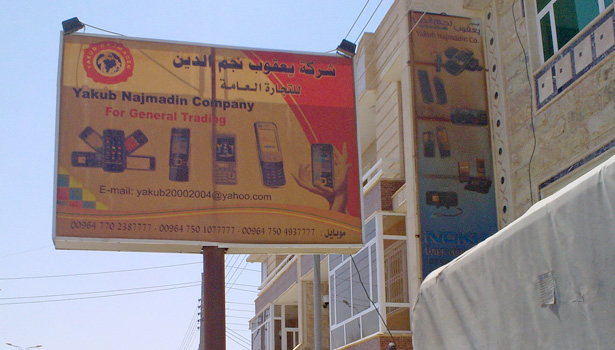From Street Peddler to Store Owner: Entrepreneurship in Iraq
Jul 13, 2010

Story Highlights
How one man built a cell phone empire from tomato paste.
Why one man says any poor person should give business a try.
Yakub Najmaldeen, 31, faced the same challenges as many Iraqis did when he was a child. He was poor. He had a big family to take care of. At the age of 9, during the Iran-Iraq War, Yakub made just a few dinar each day by carrying stacks of bread loaves on his head and selling them to people on the street. He pressed himself against the walls of stores and cried when sirens alerted the city that Iranian bombers were nearby.
Yakub didn't accept his conditions. He decided to throw everything he had into improving his and his family's life. In two decades, Yakub went from a peddler in the streets to a vastly wealthy businessman.
His father was sick and his family needed money for medicine, food and a roof over their heads.
"I helped myself and all my family, by myself," Yakub said.
As a child, he wandered the streets of Erbil from 6 in the morning to 9 at night, offering people bread and cigarettes.
In 1989, at age 10, his father lent him 650 dinar to start a money exchange business. "I remember I earned 750 dinar during the first 15 days, which was really great," he said.
In 1991, Iraq freely traded with Turkey and Iran. So, at the age of 12, Yakub decided to travel to Haji Omran to sell cigarettes to traders, who crossed through the border town every day. He began to watch how they conducted their sales.
"I got the idea about how to do business [from the traders]. After I collected some money from selling cigarettes and helping them to carry their heavy things, I decided to try my own hand at their business," he explained.
That same year, Yakub began his first real business by smuggling tomato paste from Iran and selling it in Kirkuk and Erbil.
He knew that tomato paste was hard to find in Iraq and very expensive to buy. He planned buy cans of it from Iran, where he could find it inexpensively and sell it at a profit in Kirkuk. But the plan failed. No one wanted to buy his tomato paste.
"I lost all my money in that business, so I tried to take another chance. I moved to work in Alton Kobre, a small village between Kirkuk and Erbil, with Mobile Center, in 2003." In the village he learned the basics of mobile phone sales.
"I bought two Nokia mobiles and I sold them each with a dollar profit, then I bought more and only made a few more dollars on it," Yakub said.
In 2006, Yakub returned to Erbil to expand his mobile phone business and little by little, he grew his company.
In 20 years Yakub has tried many different jobs, but his most recent venture has proven to be his most successful - it now consists of four stores and 10 employees.
"I learned that any poor person should give business a try. I started from nothing and every day I have to work from 10 a.m. to 12 a.m. to keep my company going."
Yakub isn't satisfied with the business he has now. He will always be concerned about losing the businesses that he built. "People should try their chances and never give up if they fail." To Yakub, a misstep isn't the end of the world. It's just a chance to find a new direction.
Above Photo: Yakub Najmaldeen runs a cell phone business in Erbil, Iraq, which he started by selling individual cigarettes on the street. (Photo: Sahar Alani / The Tiziano Project)
Add your comment